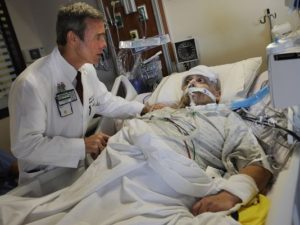- LESS SEDATION – Use less sedation and keep patients more awake for longer
- MORE ALERT – Keep patients alert and walking around in the ICU, even while still on a ventilator
- GET UP SOONER – Patients should be walking earlier
- COGNITIVE REHAB – “Brain exercises”, such as challenging games, help rebuild cognitive function and memory, especially once a patient is released from the hospital.
Several years ago my husband had 7 anesthesia’s in a five month period for a series of medical issues that they had great difficulty identifying… they never were successful. Having had that amount of anesthesia in his system, left him with MCI – mild cognitive impairment. He could function normally, except when it came to his cell phone and computer. He was never able to load information into his calendar on his phone accurately or remember the specifics of dates and times, even though I had told him this information 3-4 times at one sitting. He was forever pulling up the wrong year or putting times in PM instead of AM. Consequently he missed doctor’s appointments and other events that he should have been aware of in his calendar. I also started keeping a double calendar – his and mine – so he would not miss his appointments. He could not figure out how to open his computer and get to his files. Once he was there with my help, he was fine and would spend hours writing. He was able to function in every other way, but our family saw a dramatic difference in his ability to work with his cell phone and computer following his hospitalizations.
Anesthesia is a good and necessary thing for the medical community, but as with everything we put into our bodies, there can be side effects. If you have upcoming surgery, talk with your doctors about the above protocols to improve your brain response after hospitalization.


Leave a Reply